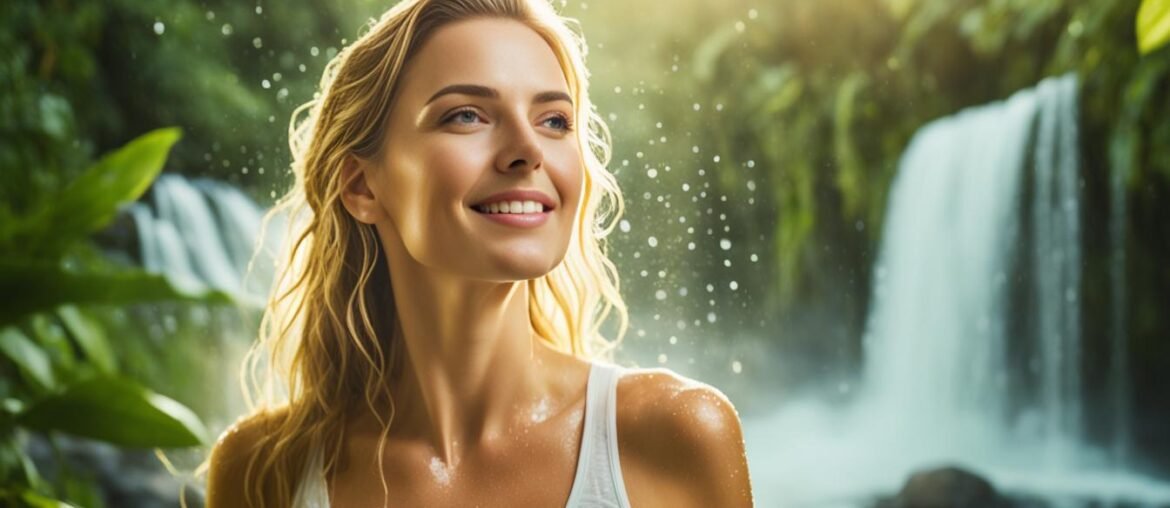Did you know that our skin loses approximately 500 milliliters (~2 cups) of water every day? This startling fact highlights the importance of natural skin hydration and aging treatments in maintaining a youthful and radiant complexion. As we age, our skin undergoes various changes that can lead to the appearance of wrinkles and a dull complexion. However, with the use of effective natural remedies and a consistent skincare routine, we can nourish and hydrate our skin, reducing the signs of aging and achieving healthier, more youthful-looking skin.
Key Takeaways:
- Invest in the best natural skin hydration products to replenish the moisture in your skin.
- Explore various natural remedies for skin hydration and incorporate them into your skincare routine.
- Consider anti-aging skincare solutions that focus on nourishing and hydrating the skin.
- Develop a hydrating skincare routine and stick to it to maintain a youthful appearance.
- Explore the benefits of natural ingredients for youthful skin and incorporate them into your skincare rituals.
Understanding the Aging Process
The aging process is a natural phenomenon that affects the skin in various ways. It involves both intrinsic and extrinsic factors that contribute to changes in the skin’s appearance and health. By understanding the aging process, we can implement effective natural skin hydration and aging treatments to maintain a youthful complexion.
Intrinsic Aging: Intrinsic aging refers to the natural aging process that occurs over time. It is influenced by genetic factors and leads to the gradual loss of collagen and elastin, which are essential proteins for maintaining firmness and elasticity in the skin.
Extrinsic Aging: Extrinsic aging, also known as photoaging, is caused by external factors that accelerate the aging process. The most common factors include:
- Sun Exposure: Prolonged exposure to the sun’s harmful UV rays can damage collagen and elastin fibers in the skin, leading to wrinkles, age spots, and a leathery texture.
- Smoking: Smoking reduces blood flow to the skin, resulting in oxygen and nutrient deprivation, which contributes to premature aging.
- Environmental Pollutants: Exposure to pollutants, such as air pollution and toxins, can generate harmful free radicals that initiate oxidative stress and accelerate the aging process.
With age, the skin undergoes several changes, including:
- Thinning of the epidermis (outermost layer of the skin)
- Loss of fat and moisture in the dermis (middle layer of the skin)
- Reduction in collagen and elastin production
- Slower cell turnover and healing process
- Decreased natural oil production
These changes contribute to the development of wrinkles, fine lines, sagging skin, and a dull complexion.
Causes of Wrinkles: Wrinkles are one of the most visible signs of aging. They occur due to a combination of factors, including:
- Sun Exposure: As mentioned earlier, prolonged exposure to the sun leads to collagen and elastin breakdown, resulting in the formation of wrinkles.
- Smoking: Smoking damages collagen and elastin fibers, causing wrinkles to appear prematurely.
- Genetics: Some individuals may be genetically predisposed to wrinkle formation and signs of aging.
- Skin Care Routine: A lack of proper skincare routine, including moisturization and protection from environmental factors, can contribute to the development of wrinkles.
Understanding the Role of Genetics
Genetics plays a crucial role in the aging process. Some individuals are genetically predisposed to age slower or show fewer signs of aging compared to others. However, even with favorable genetic factors, adopting natural skin hydration and aging treatments is still essential to maintain optimal skin health and slow down the aging process.
By understanding the aging process and the factors that contribute to changes in the skin, we can implement effective natural skin hydration and aging treatments. These treatments will help combat the signs of aging, reduce the appearance of wrinkles, and promote a more youthful and radiant complexion.
Home Remedies for Wrinkles and Aging Skin
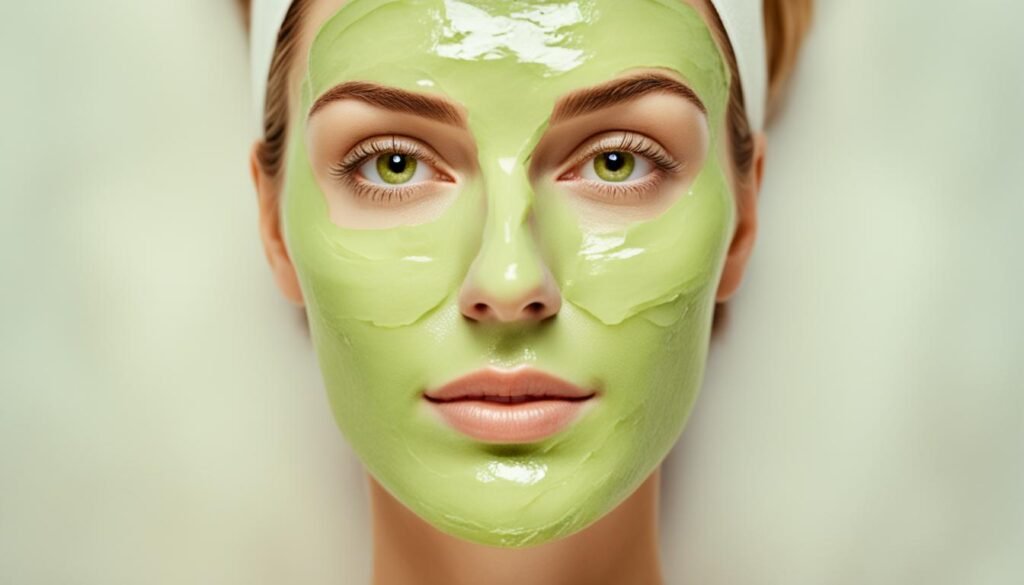
When it comes to combating wrinkles and aging skin, there are several natural home remedies that can help restore your skin’s youthful appearance. These remedies utilize the power of natural ingredients and holistic practices to nourish and rejuvenate the skin, promoting natural skin hydration and aging treatments. Incorporate these remedies into your skincare routine for noticeable results.
1. Aloe Vera
Aloe vera is a versatile plant that offers numerous skincare benefits. Its gel-like substance is rich in antioxidants and contains vitamins A, C, and E, which can help reduce wrinkles and improve skin elasticity. Apply pure aloe vera gel or products containing aloe vera onto the skin regularly to benefit from its moisturizing and anti-aging properties.
2. Banana Mask
Did you know that bananas can be used as a natural face mask? Mash a ripe banana and apply it to your face for around 15 minutes. The banana’s nutrients, including vitamins A, B, and E, and natural enzymes can help nourish the skin, improve elasticity, and reduce the appearance of fine lines and wrinkles.
3. Superfoods
Include superfoods rich in antioxidants and essential nutrients in your diet to support skin health and combat the signs of aging. Berries, leafy greens, and fatty fish are excellent choices. These superfoods provide protective antioxidants that fight free radicals and promote healthy skin.
4. Egg Whites
Egg whites can help tighten the skin and reduce the appearance of wrinkles. Separate the egg white from the yolk and apply it to your face. Leave it on for about 15 minutes until it dries, then wash it off with warm water. The proteins in egg whites can temporarily tighten the skin, giving it a smoother and more youthful appearance.
5. Essential Oils
Essential oils such as rosehip oil, lavender oil, and frankincense oil contain potent properties that can benefit aging skin. These oils are rich in antioxidants and moisturizing compounds that can help improve skin elasticity, reduce inflammation, and diminish the appearance of wrinkles. Dilute the essential oils with a carrier oil and massage them gently onto your skin.
6. Massage
Regular facial massage can stimulate blood circulation, promote lymphatic drainage, and improve the absorption of skincare products. Use gentle upward strokes and circular motions to massage your face with clean fingertips or a facial massage tool. This practice can help relax facial muscles, reduce tension, and contribute to a more youthful complexion.
7. Olive Oil
Olive oil is a natural moisturizer that helps nourish the skin and lock in moisture. It contains antioxidants and healthy fats that can promote a youthful appearance and protect against free radicals. Massage a small amount of olive oil onto your face, focusing on areas prone to wrinkles, and leave it on overnight. Rinse off in the morning for softer, more hydrated skin.
8. Topical Vitamin C
Vitamin C is a potent antioxidant that can help brighten the skin and reduce the appearance of fine lines and wrinkles. Incorporate a topical vitamin C serum into your skincare routine to stimulate collagen production, improve skin tone, and protect against environmental damage. Apply the serum onto clean, dry skin and follow with moisturizer.
9. Minerals and Probiotics
Minerals like zinc and copper, along with probiotics, play a vital role in maintaining healthy skin. These nutrients support collagen production, improve skin barrier function, and promote overall skin health. Consider incorporating mineral-rich foods and probiotic supplements into your diet to benefit from their skin-supporting properties.
10. Silk or Copper Oxide Pillowcases
The fabric you sleep on can impact your skin’s health. Switching to silk or copper oxide pillowcases can help reduce friction on the skin during sleep, minimizing the formation of wrinkles and preventing sleep lines. These pillowcases are also less likely to absorb moisture from your skin, allowing for better natural skin hydration.
While these home remedies can provide noticeable improvements, it’s important to remember that some aging concerns may require medical treatment. If your wrinkles or signs of aging are severe or persistent, consult a dermatologist who can recommend appropriate medical treatments or procedures to address your specific needs.
Enhance your skincare routine with these natural remedies to address wrinkles and aging skin. These home remedies, such as aloe vera, banana masks, essential oils, and more, can help nourish your skin and promote a more youthful complexion.
The Importance of Moisturizing
Proper moisturization is essential for maintaining hydrated and youthful-looking skin. As we age, our skin tends to become drier and loses its natural ability to retain moisture. This can lead to the development of fine lines, wrinkles, and a dull complexion. To combat these effects, it is crucial to incorporate moisturizing steps into your skincare routine.
Moisturizing agents play a vital role in keeping the skin hydrated. They can be categorized into three main types: emollients, occlusives, and humectants.
Emollients:
Emollients are moisturizing ingredients that help soften and smooth the skin’s surface. They work by filling in the gaps between skin cells, creating a protective barrier and preventing moisture loss. Natural oils like shea butter, argan oil, almond oil, and coconut oil are excellent examples of emollients. These oils are rich in essential fatty acids and vitamins that nourish the skin and restore its natural barrier function.
Occlusives:
Occlusives are moisturizing agents that form a physical barrier on the skin’s surface, trapping moisture beneath. They help prevent water loss and protect the skin from environmental stressors. Examples of occlusives include petrolatum, lanolin, and beeswax. These ingredients create a protective seal, locking in moisture and keeping the skin hydrated throughout the day.
Humectants:
Humectants are moisturizing ingredients that attract and retain water from the environment and the deeper layers of the skin. They help to hydrate the skin from within, improving its texture and elasticity. Popular humectants used in skincare include hyaluronic acid and glycerine. These ingredients have the ability to hold vast amounts of water, providing intense hydration and plumping the skin.
By incorporating moisturizing agents into your skincare routine, you can effectively combat dryness and prevent moisture loss. Start by cleansing your skin gently and then apply a moisturizer or serum containing emollients, occlusives, and humectants. This combination will help lock in moisture, replenish the skin’s natural barrier, and promote natural skin hydration and aging treatments.
Remember, moisturizing is not only crucial for those with dry skin. Even individuals with oily or combination skin types can benefit from proper moisturization as it helps balance the skin’s natural oil production and prevents excessive dryness or oiliness.
“Moisturizing agents like emollients, occlusives, and humectants play a vital role in retaining moisture and promoting healthy skin. They restore the skin’s natural barrier, leaving it hydrated, plump, and youthful-looking.” – Skincare Expert
To enhance the effectiveness of moisturizing, consider incorporating other skincare practices such as exfoliation, using a gentle cleanser, and protecting your skin from harmful UV rays. Maintaining a consistent skincare routine tailored to your skin’s specific needs will yield long-term benefits in achieving natural skin hydration and aging treatments.
The Power of Antioxidants
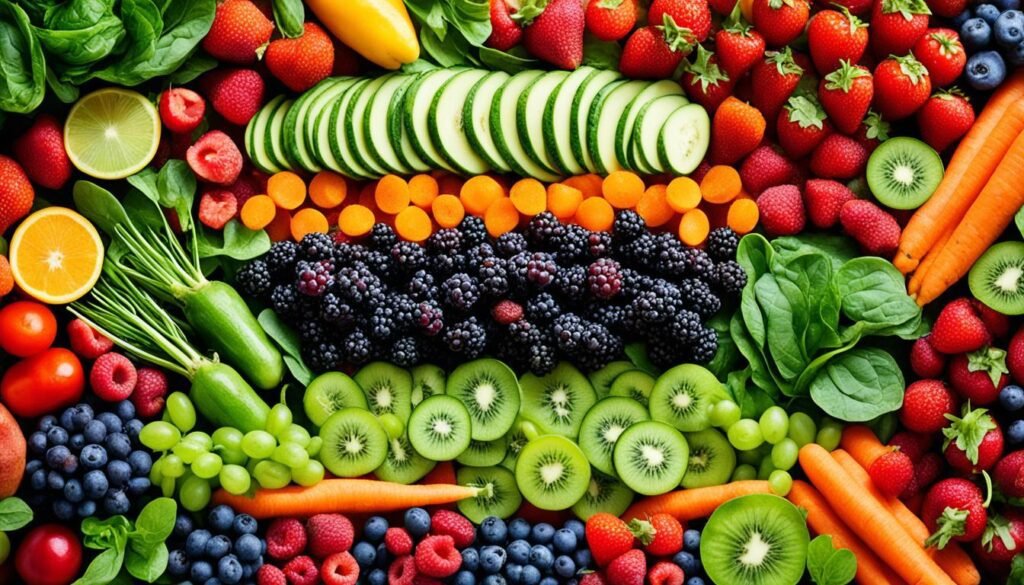
Antioxidants are a fundamental component of natural skin hydration and aging treatments. These remarkable compounds play a crucial role in protecting the skin from free radicals and oxidative damage, which can accelerate the aging process. By incorporating antioxidants into your skincare routine, you can nourish your skin and promote a more youthful appearance.
There are two main categories of antioxidants: water-soluble and oil-soluble. Water-soluble antioxidants, such as vitamin C, coffeeberry, green tea, and glutathione, help neutralize free radicals in the aqueous environment of our skin cells. On the other hand, oil-soluble antioxidants, including vitamin E and vitamin A, are particularly effective at combating free radicals in the lipid-rich areas of the skin.
Let’s explore some of the key antioxidants beneficial for natural skin hydration and aging treatments:
1. Vitamin C
Vitamin C is a powerful water-soluble antioxidant that protects the skin from free radicals and stimulates collagen production. It helps reduce the appearance of wrinkles and promotes a more youthful and radiant complexion.
2. Coffeeberry
Coffeeberry is another potent water-soluble antioxidant derived from the fruit of the coffee plant. It offers photoprotective properties and aids in reducing photoaging effects caused by sun exposure.
3. Green Tea
Green tea contains catechins, which are powerful water-soluble antioxidants. These antioxidants help protect the skin from UV damage and reduce inflammation, supporting natural skin hydration and aging treatments.
4. Glutathione
Glutathione is a vital water-soluble antioxidant naturally produced in our bodies. It helps neutralize free radicals, detoxify the skin, and improve overall skin health.
5. Vitamin E
Vitamin E is an oil-soluble antioxidant that provides exceptional protection against free radicals and oxidative stress. It helps hydrate the skin, reduce the appearance of wrinkles, and improve skin texture.
6. Vitamin A
Vitamin A, often referred to as retinol, is an oil-soluble antioxidant known for its powerful anti-aging properties. It promotes collagen production, improves skin tone and texture, and helps reduce the appearance of fine lines and wrinkles.
By incorporating antioxidant-rich ingredients and supplements into your skincare routine, you can provide your skin with essential protection against the damaging effects of free radicals and oxidative stress, ensuring natural skin hydration and effective aging treatments.
References:
- “Antioxidants in dermatology” – Kaur C. D., Saraf S., Department of Pharmaceutics, University Institute of Pharmaceutical Sciences, Panjab University, Chandigarh, India.
- “Antioxidants in dermatology” – Poljšak B., Dahmane R., Daya S., J Biol Regul Homeost Agents.
- “Antioxidants: Their Role in Skin Aging” – Podder I., Department of Physiology, All India Institute of Medical Sciences, New Delhi, India.
Harnessing the Power of Vitamins
Vitamins play a vital role in maintaining skin health and combating the signs of aging. These essential nutrients are key players in natural skin hydration and aging treatments, helping to nourish and rejuvenate the skin. By understanding the benefits of specific vitamins, you can incorporate them into your skincare routine for a more youthful complexion.
Vitamin C: Stimulating Collagen Production
One of the most powerful vitamins for skin health, vitamin C stimulates collagen production, a protein that gives our skin its structure and elasticity. Collagen helps reduce the appearance of wrinkles and fine lines, resulting in smoother, more youthful skin. Whether consumed through oral intake or applied topically, vitamin C can help improve skin elasticity and reduce signs of aging.
Vitamin E: Powerful Antioxidant Protection
Vitamin E is a potent antioxidant that helps protect the skin from free radicals and oxidative damage. Free radicals are unstable molecules that can damage collagen and elastin, leading to premature aging and wrinkles. By incorporating vitamin E into your skincare routine, either through oral intake or topical application, you can help safeguard your skin and maintain its youthful appearance.
Vitamin A: Promoting Collagen Production
Vitamin A promotes collagen production, helping to reduce the appearance of fine lines, wrinkles, and uneven skin tone. It is commonly found in skincare products in the form of retinoids or retinol, which can be used topically. By stimulating collagen production, vitamin A supports the skin’s natural renewal process and contributes to a more youthful complexion.
Vitamin B3: Repairing and Moisturizing the Skin
Vitamin B3, also known as niacinamide, aids in skin repair and moisturization. It helps strengthen the skin’s protective barrier, reducing water loss and keeping the skin hydrated. Additionally, vitamin B3 can improve skin texture and tone, making it an essential ingredient in natural skin hydration and aging treatments. It can be applied topically or consumed through oral supplements.
By harnessing the power of vitamins, you can enhance your natural skin hydration and aging treatments. Whether it’s boosting collagen production, protecting the skin from oxidative damage, or repairing and moisturizing the skin, vitamins play a significant role in maintaining a youthful and radiant complexion.
| Vitamin | Benefits | Application |
|---|---|---|
| Vitamin C | Stimulates collagen production, reduces wrinkles | Oral intake or topical application |
| Vitamin E | Powerful antioxidant protection | Oral intake or topical application |
| Vitamin A | Promotes collagen production, reduces fine lines | Topical application |
| Vitamin B3 | Repairs and moisturizes the skin | Oral intake or topical application |
The Benefits of Hydroxy Acids
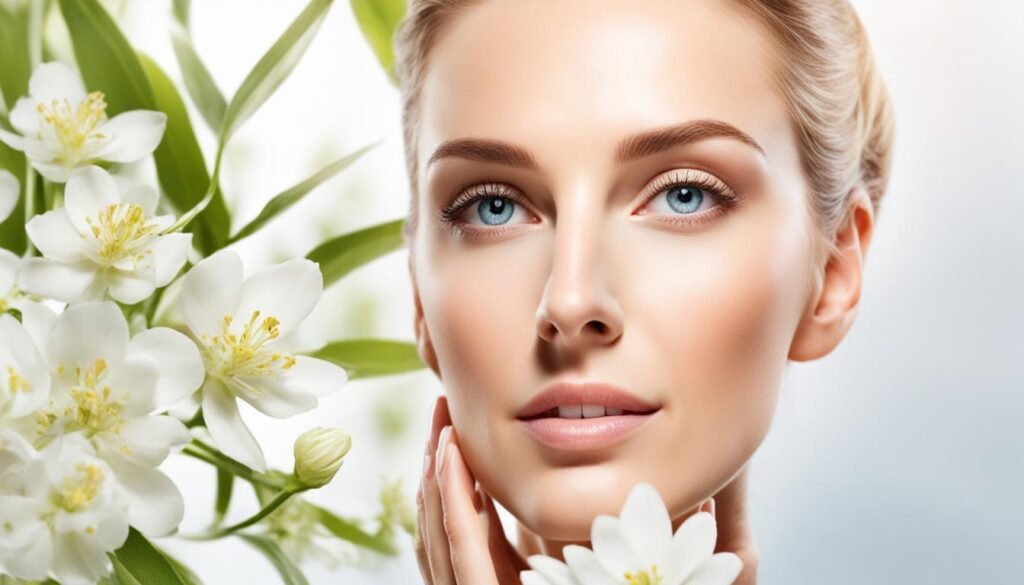
Hydroxy acids, including both alpha-hydroxy acids (AHAs) and beta-hydroxy acids (BHAs), play a significant role in natural skin hydration and aging treatments. These acids offer several benefits that can promote a more youthful and rejuvenated complexion.
Exfoliation and Skin Renewal
Alpha-hydroxy acids, such as citric acid, lactic acid, glycolic acid, tartaric acid, and malic acid, are well-known for their exfoliating properties. By gently removing the outer layer of dead skin cells, these acids stimulate cell turnover and promote the growth of new, healthy skin cells. This process can help reduce the appearance of fine lines, wrinkles, and discoloration, revealing smoother and more radiant skin.
Enhanced Skincare Routine
Regular use of skincare products containing hydroxy acids can enhance the effectiveness of your overall skincare routine. These acids work by exfoliating the skin, allowing for better absorption of other skincare ingredients. This means that moisturizers, serums, and other treatments used in conjunction with hydroxy acids can penetrate the skin more effectively, maximizing their benefits and improving overall skin hydration.
Skin Rejuvenation
The exfoliating properties of hydroxy acids also stimulate collagen production in the skin. Collagen is a vital component that helps maintain skin elasticity and firmness. By promoting collagen synthesis, hydroxy acids can help reduce the appearance of fine lines and wrinkles, leading to a more youthful and rejuvenated complexion.
Incorporating hydroxy acids into your skincare routine can be done through various products, such as cleansers, toners, exfoliants, and peels. However, it is essential to use these products in moderation and always follow the instructions provided. Overuse or incorrect application of hydroxy acid products can lead to skin irritation or sensitivity.
To determine the most suitable hydroxy acid products for your skin type and concerns, consult with a dermatologist or skincare professional. They can assess your specific needs and recommend the best products and concentrations to incorporate into your skincare routine.
Natural Sun Protection
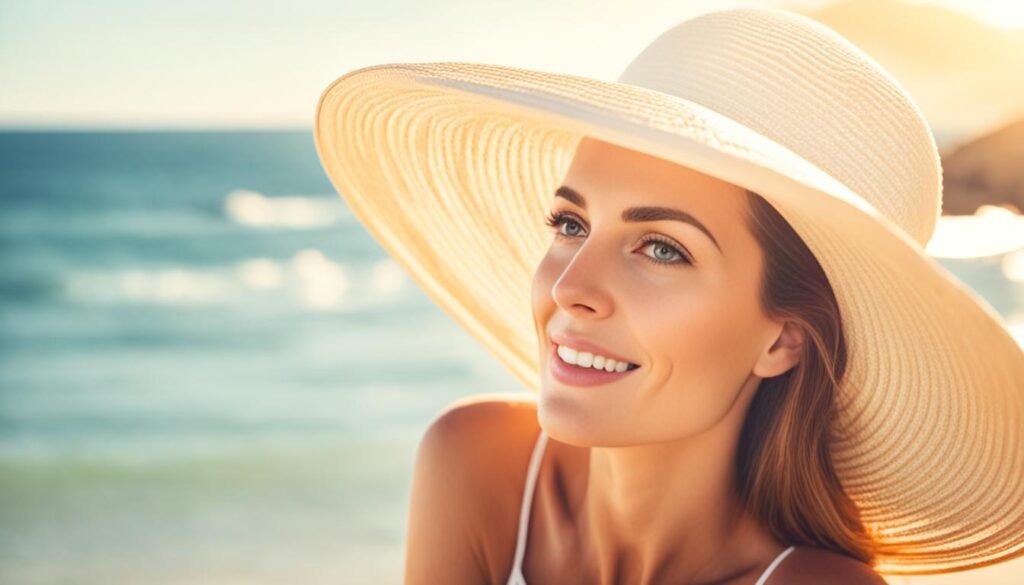
Protecting the skin from the damaging effects of the sun is crucial for natural skin hydration and aging treatments. To shield your skin from harmful UV rays, consider using natural sunscreen alternatives that provide both protection and nourishment. These ingredients offer a level of defense against sunburn, sunspots, and other signs of sun damage, allowing your skin to maintain its youthful appearance.
Aloe Vera: Aloe vera has long been recognized for its soothing properties. Applying aloe vera gel directly to the skin can provide a protective barrier against UV rays while soothing and hydrating the skin.
Coconut Oil: Coconut oil contains natural SPF properties and can be used as a moisturizing sunscreen. Apply coconut oil generously to exposed skin before sun exposure for added hydration and sun protection.
Ginger: Ginger contains antioxidants that help protect the skin from the harmful effects of the sun. Consider consuming ginger-infused beverages or incorporating ginger extract into your skincare routine for its protective properties.
Green Tea: Green tea is rich in antioxidants that assist in combating the effects of UV exposure. Drinking green tea regularly and applying cooled green tea bags to the skin can help protect against sunburn and promote natural skin hydration.
Shea Butter: Shea butter is a moisturizing and nourishing ingredient that offers a natural SPF of approximately 6. It can be applied as a protective layer on the skin, guarding against sun damage while keeping the skin well-hydrated.
Vitamin E: Vitamin E is a powerful antioxidant that helps protect the skin from the damaging effects of the sun. Consider using skincare products enriched with vitamin E or apply pure vitamin E oil to the skin for added sun protection.
Caffeic Acid: Caffeic acid, found in plants like chamomile and sunflower, offers anti-inflammatory and antioxidant benefits. It can provide protection against UV-induced skin damage when applied topically.
Tamanu Oil: Tamanu oil is known for its skin-healing properties and natural sun protection abilities. Applying tamanu oil before sun exposure can act as a barrier, protecting the skin from harmful UV rays.
By incorporating these natural ingredients into your skincare routine, you can enhance your skin’s defenses against sun damage, preventing sunburn, sunspots, and other signs of aging. Remember to reapply natural sunscreen regularly, especially during extended periods of sun exposure, to ensure continuous protection and natural skin hydration.
The Power of Skin Lightening Agents
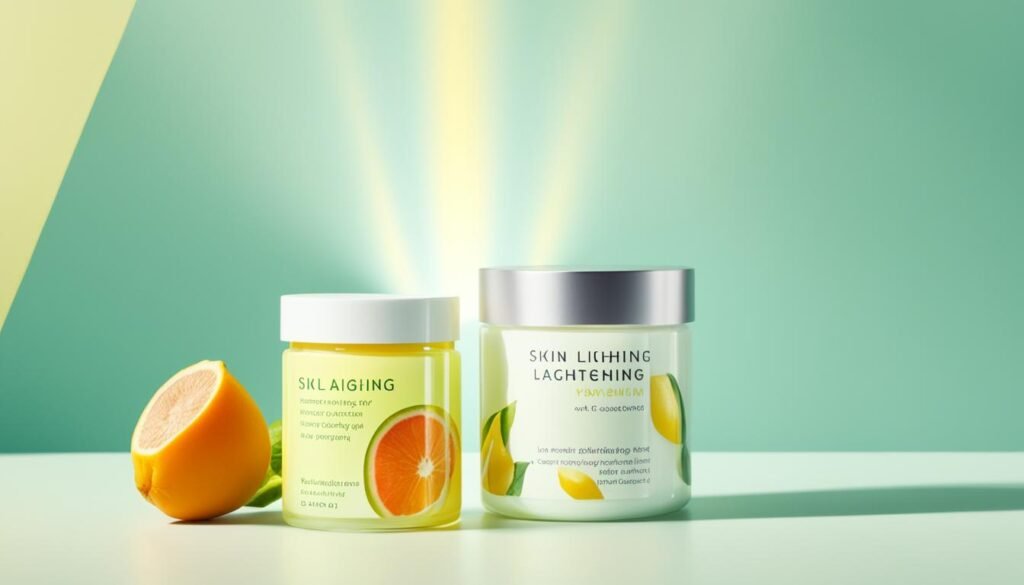
As we age, dark spots, hyper-pigmentation, and an uneven skin tone can become a concern. That’s where skin lightening agents come in. These powerful natural ingredients have the ability to address these skin issues and enhance the effectiveness of natural skin hydration and aging treatments.
One of the key skin lightening agents is white mulberry extract. This extract contains compounds that inhibit melanin production, helping to fade dark spots and even out skin tone.
Bearberry extract, derived from the bearberry plant, is another effective skin lightening agent. It contains a natural compound called arbutin, which has been shown to lighten hyper-pigmentation and promote a more balanced complexion.
Licorice root extract is known for its skin brightening properties. It contains glabridin, a compound that inhibits the production of melanin, helping to reduce the appearance of dark spots and uneven skin tone.
Kojic acid, derived from various fungi, is a potent skin lightening agent. It works by inhibiting the activity of tyrosinase, an enzyme involved in melanin production. Regular use of products containing kojic acid can help fade dark spots and promote a more radiant complexion.
By incorporating these skin lightening agents into your skincare routine, you can effectively address dark spots, hyper-pigmentation, and an uneven skin tone. These natural ingredients provide a safe and gentle alternative to harsh chemical skin lightening treatments, supporting your natural skin hydration and aging treatments.
Note: The image above is a visual representation and does not depict actual products or specific brands.
Additional Natural Anti-Aging Practices
When it comes to natural skin hydration and aging treatments, adopting a healthy lifestyle is just as crucial as using skincare remedies. By incorporating these additional practices into your routine, you can enhance the effectiveness of your skincare regimen and promote long-term skin health.
Maintain a Balanced Diet
Eating a balanced diet rich in nutrients is essential for healthy and youthful-looking skin. Incorporate foods that are high in antioxidants, vitamins, and minerals, such as fruits, vegetables, whole grains, and lean proteins. These foods provide the necessary building blocks for collagen production and help protect the skin against environmental damage.
Stay Hydrated
Proper hydration is key to maintaining supple and radiant skin. Drink an adequate amount of water throughout the day to keep your skin hydrated from within. Additionally, you can incorporate hydrating foods like cucumbers, watermelon, and citrus fruits into your diet.
Regular Exercise
Engaging in regular physical activity promotes healthy blood circulation, which delivers essential nutrients to the skin cells. Exercise also helps reduce stress and boosts mood, which can positively impact your skin’s appearance.
Stress Management
High stress levels can contribute to premature aging and skin damage. Practice stress management techniques such as meditation, deep breathing exercises, or yoga to promote overall well-being and maintain healthy skin.
Adequate Sleep
Getting enough quality sleep is vital for skin rejuvenation and repair. Aim for 7-9 hours of uninterrupted sleep each night to allow your skin to regenerate and recover.
“A healthy lifestyle, including a balanced diet, hydration, exercise, stress management, and adequate sleep, plays a crucial role in supporting natural skin hydration and aging treatments.”
Silk or Copper Oxide Pillowcases
Consider investing in silk or copper oxide pillowcases to minimize friction on your skin while you sleep. These materials are gentler on the skin compared to traditional cotton pillowcases and can help prevent the development of sleep lines and wrinkles.
Medical Treatments
In more severe cases of aging, medical treatments may be recommended by dermatologists or cosmetic surgeons. These treatments may include procedures like laser therapy, chemical peels, or injectables, which can provide targeted solutions to specific skin concerns.
Remember, maintaining a healthy lifestyle is a holistic approach to natural skin hydration and aging treatments. By combining these practices with effective skincare remedies, you can promote youthful-looking skin and embrace the aging process with confidence.
Conclusion
In conclusion, natural skin hydration and aging treatments provide an effective and holistic approach to maintaining youthful-looking skin and promoting overall skin health. By incorporating these remedies into your skincare routine and embracing a healthy lifestyle, you can age gracefully and achieve healthier, more radiant skin.
Remember to prioritize hydration, nourishment, and protection in your skincare routine. Focus on using natural ingredients, such as aloe vera, essential oils, and antioxidant-rich superfoods, to nourish and hydrate your skin. Additionally, don’t forget the importance of moisturization and the benefits of incorporating vitamins, hydroxy acids, natural sun protection, and skin lightening agents into your beauty regimen.
By adopting these natural skin hydration and aging treatments, you can combat the aging process and achieve youthful-looking skin. Invest in your skin health and embrace a consistent skincare routine to reap the benefits of natural remedies. With proper care and attention, you can age gracefully and maintain a radiant complexion.
FAQ
What are natural skin hydration and aging treatments?
Natural skin hydration and aging treatments refer to the use of natural remedies and skincare practices to nourish and hydrate the skin, reducing the appearance of wrinkles and promoting a more youthful appearance.
What causes the aging process?
The aging process includes both intrinsic and extrinsic factors. Intrinsic aging occurs naturally over time and is influenced by genetic factors. Extrinsic aging, or photoaging, is caused by external factors such as sun exposure, smoking, and environmental pollutants.
Are there any home remedies for wrinkles and aging skin?
Yes, there are several home remedies available, including the use of aloe vera, banana masks, superfoods rich in nutrients, egg whites, essential oils, massage, olive oil, topical vitamin C, minerals, probiotics, and silk or copper oxide pillowcases.
Why is moisturizing important for the skin?
Proper moisturization is essential for maintaining hydrated and youthful-looking skin. Different types of moisturizing agents, such as emollients, occlusives, and humectants, play a crucial role in retaining moisture in the skin.
How do antioxidants contribute to natural skin hydration and aging treatments?
Antioxidants help protect the skin from free radicals and oxidative damage, which can accelerate the aging process. Incorporating antioxidant-rich ingredients and supplements can help nourish the skin and promote a youthful appearance.
What vitamins are important for maintaining skin health?
Vitamins such as vitamin C, vitamin E, vitamin A, and vitamin B3 play a crucial role in maintaining skin health and combating the signs of aging. These vitamins can be obtained through oral intake or topical application.
What are the benefits of hydroxy acids for the skin?
Hydroxy acids, including alpha-hydroxy acids and beta-hydroxy acids, promote exfoliation and skin renewal. Regular use of products containing hydroxy acids can help reduce the appearance of fine lines, wrinkles, and discoloration, resulting in smoother and rejuvenated skin.
Are there natural alternatives for sun protection?
Yes, natural sunscreen alternatives like aloe vera, coconut oil, ginger, green tea, shea butter, vitamin E, caffeic acid, and tamanu oil offer some level of protection against harmful UV rays.
What are some skin lightening agents for improving skin tone?
Natural ingredients such as white mulberry extract, bearberry extract, licorice root extract, and kojic acid possess skin lightening properties and can help fade dark spots and improve the overall appearance and clarity of the skin.
Apart from skincare, what other natural anti-aging practices should I adopt?
Adopting a healthy lifestyle is crucial for natural skin hydration and aging treatments. This includes maintaining a balanced diet, staying hydrated, regular exercise, stress management, getting adequate sleep, and using silk or copper oxide pillowcases to prevent wrinkles during sleep.
How can natural skin hydration and aging treatments improve my skin?
By incorporating natural remedies and skincare practices into your routine, you can nourish and hydrate your skin, reduce the appearance of wrinkles, and promote overall skin health. These treatments offer a holistic approach to maintaining youthful-looking skin and aging gracefully.

